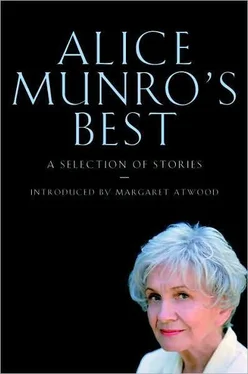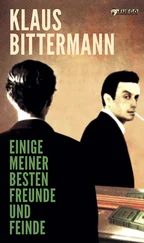Every day when Sophie took Daisy’s hand-washed sheets off the line, she had to shake out the corn bugs.
“It means ‘bowel movement,’” said Philip with a look of sly challenge at Eve.
Eve halted in the doorway. Last night she and Sophie had watched Meryl Streep sitting in the husband’s truck, in the rain, pressing down on the door handle, choking with longing, as her lover drove away. Then they had turned and had seen each other’s eyes full of tears and shook their heads and started laughing.
“Also it means ‘Big Mama,’” Philip said in a more conciliatory tone. “Sometimes that’s what Dad calls her.”
“Well then,” said Eve. “If that’s your question, the answer to your question is yes.”
She wondered if he thought of Ian as his real father. She hadn’t asked Sophie what they’d told him. She wouldn’t, of course. His real father had been an Irish boy who was travelling around North America trying to decide what to do now that he had decided not to be a priest. Eve had thought of him as a casual friend of Sophie’s, and it seemed that Sophie had thought of him that way too, until she seduced him. (“He was so shy I never dreamed it would take,” she said.) It wasn’t until Eve saw Philip that Eve could really picture what the boy had looked like. Then she saw him faithfully reproduced — the bright-eyed, pedantic, sensitive, scornful, fault-finding, blushing, shrinking, arguing young Irishman. Something like Samuel Beckett, she said, even to the wrinkles. Of course as the baby got older, the wrinkles tended to disappear.
Sophie was a full-time archaeology student then. Eve took care of Philip while she was off at her classes. Eve was an actress — she still was, when she could get work. Even in those days there were times when she wasn’t working, or if she had daytime rehearsals she could take Philip along. For a couple of years they all lived together — Eve and Sophie and Philip — in Eve’s apartment in Toronto. It was Eve who wheeled Philip in his baby carriage — and, later on, in his stroller — along all the streets between Queen and College and Spadina and Ossington, and during these walks she would sometimes discover a perfect, though neglected, little house for sale in a previously unknown to her two-block-long, tree-shaded, dead-end street. She would send Sophie to look at it; they would go round with the real-estate agent, talk about a mortgage, discuss what renovations they would have to pay for, and which they could do themselves. Dithering and fantasizing until the house was sold to somebody else, or until Eve had one of her periodic but intense fits of financial prudence, or until somebody persuaded them that these charming little side streets were not half so safe for women and children as the bright, ugly, brash, and noisy street that they continued to live on.
Ian was a person Eve took even less note of than she had of the Irish boy. He was a friend; he never came to the apartment except with others. Then he went to a job in California — he was an urban geographer — and Sophie ran up a phone bill which Eve had to speak to her about, and there was a change altogether in the atmosphere of the apartment. (Should Eve not have mentioned the bill?) Soon a visit was planned, and Sophie took Philip along, because Eve was doing a summer play in a regional theater.
Not long afterwards came the news from California. Sophie and Ian were going to get married.
“Wouldn’t it be smarter to try living together for a while?” said Eve on the phone from her boarding house, and Sophie said, “Oh, no. He’s weird. He doesn’t believe in that.”
“But I can’t get off for a wedding,” Eve said. “We run till the middle of September.”
“That’s okay,” said Sophie. “It won’t be a wedding wedding.”
And until this summer, Eve had not seen her again. There was the lack of money at both ends, in the beginning. When Eve was working she had a steady commitment, and when she wasn’t working she couldn’t afford anything extra. Soon Sophie had a job, too — she was a receptionist in a doctor’s office. Once Eve was just about to book a flight, when Sophie phoned to say that Ian’s father had died and that he was flying to England for the funeral and bringing his mother back with him.
“And we only have the one room,” she said.
“Perish the thought,” said Eve. “Two mothers-in-law in one house, let alone in one room.”
“Maybe after she’s gone?” said Sophie.
But that mother stayed till after Daisy was born, stayed till they moved into the new house, stayed eight months in all. By then Ian was starting to write his book, and it was difficult for him if there were visitors in the house. It was difficult enough anyway. The time passed during which Eve felt confident enough to invite herself. Sophie sent pictures of Daisy, the garden, all the rooms of the house.
Then she announced that they could come, she and Philip and Daisy could come back to Ontario this summer. They would spend three weeks with Eve while Ian worked alone in California. At the end of that time he would join them and they would fly from Toronto to England to spend a month with his mother.
“I’ll get a cottage on the lake,” said Eve. “Oh, it will be lovely.” “It will,” said Sophie. “It’s crazy that it’s been so long.” And so it had been. Reasonably lovely, Eve had thought. Sophie hadn’t seemed much bothered or surprised by Daisy’s wetting the bed. Philip had been finicky and standoffish for a couple of days, responding coolly to Eve’s report that she had known him as a baby, and whining about the mosquitoes that descended on them as they hurried through the shoreline woods to get to the beach. He wanted to be taken to Toronto to see the Science Centre. But then he settled down, swam in the lake without complaining that it was cold, and busied himself with solitary projects — such as boiling and scraping the meat off a dead turtle he’d lugged home, so he could keep its shell. The turtle’s stomach contained an undigested crayfish, and its shell came off in strips, but none of this dismayed him.
Eve and Sophie, meanwhile, developed a pleasant, puttering routine of morning chores, afternoons on the beach, wine with supper, and late-evening movies. They were drawn into half-serious speculations about the house. What could be done about it? First strip off the living-room wallpaper, an imitation of imitation-wood panelling. Pull up the linoleum with its silly pattern of gold fleurs-de-lis turned brown by ground-in sand and dirty scrub water. Sophie was so carried away that she loosened a bit of it that had rotted in front of the sink and discovered pine floorboards that surely could be sanded. They talked about the cost of renting a sander (supposing, that is, that the house was theirs) and what colors they would choose for the paint on the doors and woodwork, shutters on the windows, open shelves in the kitchen instead of the dingy plywood cupboards. What about a gas fireplace?
And who was going to live here? Eve. The snowmobilers who used the house for a winter clubhouse were building a place of their own, and the landlord might be happy to rent it year-round. Or maybe sell it very cheaply, considering its condition. It could be a retreat, if Eve got the job she was hoping for, next winter. And if she didn’t, why not sublet the apartment and live here? There’d be the difference in the rents, and the old-age pension she started getting in October, and the money that still came in from a commercial she had made for a diet supplement. She could manage.
“And then if we came in the summers we could help with the rent,” said Sophie.
Philip heard them. He said, “Every summer?”
“Well you like the lake now,” Sophie said. “You like it here now.”
Читать дальше












